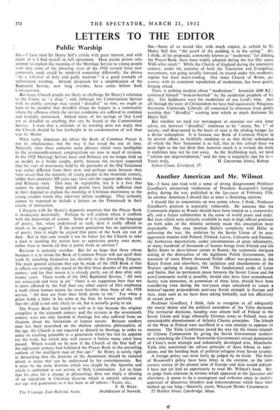Another American and Mr. Wilmot
have just read with a sense of strong disagreement Professor Goodhart's unreserved vindication of President Roosevelt's foreign policy during the war, published in the Spectator of February 15th. As another American I should like to enter a dissenting opinion.
I should like to concentrate on two points where, 1 think, Professor Goodhart's position is especially vulnerable. He assumes that the Communist regime in Russia should have been treated as a trustworthy ally and a future collaborator in the cause of world peace and order. But facts which were certainly available to men in high official positions on both sides of the Atlantic certainly made this assumption most improbable. One may mention Stalin's complicity with Hitler in unloosing the war; the violation by the Soviet Union of its non- aggression treaties with Poland, Finland, Latvia, Lithuania and Estonia; the barbarous deportations, under circumstances of great inhumanity, of many hundreds of thousands of human beings from Poland and the Baltic States to slave-labour camps in Russia; the systematic intrigues aiming at the destruction of the legitimate Polish Government; the massacre of some fifteen thousand Polish officer war-prisoners in the Katyn Forest and elsewhere; the incitation and abandonment of the Warsaw uprising in August, 1944. The fundamental credo of Lenin and Stalin, that no permanent, peace between the Soviet Union and the non-Communist world is possible, should also have been remembered. Surely wise statesmen, in possession of these facts, should have been considering even during the war-years steps calculated to create a balance" againstpreponderant post-war Soviet strength in Europe and Asia, steps such as we have been taking belatedly and less effectively in recent years.
Professor Goodhart, I think, fails to recognise at all adequately the moral shame and the political unwisdom of the Yalta decisions. The territorial decisions, handing over almost half of Poland to the Soviet Union and large ethnically German areas to Poland, were an unmistakable abandonment of Atlantic Charter principles. The friends of the West in Poland were sacrificed in a vain attempt to appease its enemies. The Yalta Conference paved the way for the future triumph of Chinese Communism by giving the Soviet Government (without even consulting the Chinese Nationalist Government) virtual domination of China's most strategic and industrially developed area, Manchuria. Yalta also sanctioned the odious principle of slave labour in repar- ations, and the handing back of political refugees from Soviet tyranny.
A foreign policy can most fairly lie judged by its fruits. The fruits of Roosevelt's policy have been bitter in the extreme, as the most cursory survey of the present state of Europe and Asia would indicate. I have not yet had an opportunity to read Mr. Wilmot's book. But, to judge from citations in reviews which appeared in the Spectator and elsewhere, it seems to be a courageous and welcome essay in realistic appraisal of disastrous blunders and misconceptions which have been hushed up too long.—Sincerely yours, WILLIAM HENRY CHAMBERLIN.
22 Holden Street, Cambridge, Mass.


































 Previous page
Previous page